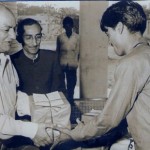Four poems by Alain Lance translated by Erika Luckert
[Comme j’en ai traversé de ces villes opaques]
by Alain LanceJe longeais opéras perdant peluche
Ah oui j’ai marché dans neige et fournaise sans désir de la fin de la parenthèse échouant vingt fois sur le delta du soir donnant à mon sang toute sa plaine
Parmi les débris la mémoire les rumeurs
Alors je m’endormais aux cicatrices des villes
Long sommeil d’une seule rivière
Lèvre posée à la lézarde du temps.
Temps criblé, éditions Obsidiane et Le temps qu’il fait, collection Les Analectes, 2000.
[As I passed through these opaque cities]
by Alain LanceAs I passed through these opaque cities crumpling the newspaper’s strange signs there were seasons and sparrows and glimmers and syllables lost all around the brazier’s coals
I wandered past opera houses losing threads
Ah yes I walked in snow and inferno having no need for a closing parenthesis run aground twenty times on the silt of the night delta giving my blood its plain
And in the debris the remembrance the rumours
So I dozed in the scars of cities
Long repose of a river alone
Lip touching the crevice of time.
translated from French by Erika Luckert[Sortant d’une page blanche]
by Alain LanceSortant d’une page blanche un faux
Marchand de poules m’offre des bocks
Des cigares quand le papier des
Figures est mâché de boulevards
Le bout de la grève vient naviguer
Entre le musée de cire et le
Festin nappé d’une crème austère
L’organiste de la transparence
Met en scène le ramage à brouiller
Goutte à goutte un géant pétrolier
Dans le noir bleuissant vers la foule
Temps criblé, éditions Obsidiane et Le temps qu’il fait, collection Les Analectes, 2000.
[Leaping from a blank page]
by Alain LanceLeaping from a blank page a false
Chicken seller offers me a mug of beer
A cigar when a chain of cutout
Figures is paper-mâchéd down the boulevard
The end of the strike threads its way
Between the wax museum and the
Feast tableclothed in an austere cream
The organist of transparency
Performs a birdsong to muddle
Drop by drop a giant oil tanker
In the blueing black toward the crowd
translated from French by Erika Luckert[Nuit]
by Alain LanceNuit
Ruelles de rats
Rares les étoiles
Nuit du mal respire
Je crie je
Rêve que j’écris
Entre lointain fracas
Et l’étroite querelle
Temps criblé, éditions Obsidiane et Le temps qu’il fait, collection Les Analectes, 2000.
[Night]
by Alain LanceNight
Cul-de-sacs of rats
Scattered stars
Night of shortened breath
I call I
Dream I scrawl
Between distant clamour
And this quarrel closer by
translated from French by Erika Luckert[Ma grand-mère se promenait]
by Alain LanceMa grand-mère se promenait dans un petit bois jaune crissant encore de je ne sais plus quel automne lorsqu’un braconnier en fuite la fit tomber au sol Quand je me penchai je ne trouvai qu’un vieux livre ouvert dont les pages ne bougeaient plus sous mon oreille appliquée J’ai pris le livre et je suis rentré au village abandonné par ses chardonnerets Un photographe sous sa cagoule pétrifiait d’un geste toute une famille de Boulanger Le ciel lui aussi était jaune et au bout de la rue il n’y avait pas encore de monument aux morts.
Temps criblé, éditions Obsidiane et Le temps qu’il fait, collection Les Analectes, 2000.
[My grandmother walked]
by Alain Lance
My grandmother walked in a little yellow wood crunching in an autumn I no longer recall till a poacher on the run knocked her down to the ground When I leaned in and pressed close my ear I only found an ancient book whose open pages moved no more Lifting the book I was taken back to a town abandoned by its orioles With one gesture a photographer beneath his hood turned a baker’s entire family to stone The sky itself was yellow too and the end of the road did not yet have any monument to the dead.
translated from French by Erika Luckert










